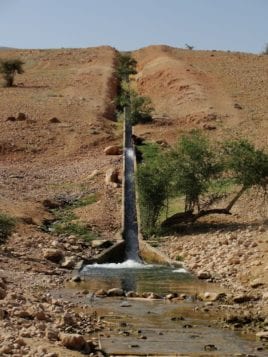The Arava Institute keeps you up to date on environmental news in the Middle East.

The deal concerns the construction of a desalination plant in Aqaba that will provide fresh water to Jordan and southern Israel, and an agreement for Israel to sell additional water to the Palestinian Authority in the northern West Bank and Gaza Strip. The brine discharge from the desalination facility will be sent via a pipeline from the Red Sea to the Dead Sea, in order to test the environmental impact of brine water mixing with the Dead Sea as a possible solution to stabilize its declining water levels. Seth Siegel, the author of Let There Be Water, calls this “hydro-diplomacy” and theorizes that such cooperation on water infrastructure could contribute to the resolution of the Israeli-Palestinian conflict.
Dr. Clive Lipchin, Director of the Center for Transboundary Water Management at the Arava Institute, is more cautious about such lofty claims. “This agreement is not new,” he emphasizes. “The agreement was actually signed in 2013… People should also not think that this is an opening for final status negotiations on the Israeli-Palestinian conflict. This agreement doesn’t, in any way, change the status quo on the ground, specifically in terms of the Palestinian position on water rights.”
“What this agreement is, is an economic agreement where Israel will sell to the Palestinian Authority an agreed-on quantity of water at an agreed price,” he says. “This is not about the sides agreeing on political issues surrounding water, which is essentially about water rights and not water needs.” The only real news is that the agreement is finally being implemented, despite being agreed upon some four years ago. Like many, Dr. Lipchin was pleased when the deal was signed, and glad that it is now finally happening. But he worries that celebrating the deal now is belittling or ignoring the grave water problems facing the Gaza Strip, where close to two million people are rapidly running out of potable water to drink.
“It’s a small step toward what’s really needed,” he says. “What needs to happen is a comprehensive agreement over water rights whereby Israel and the Palestinians agree on how much water each side has sovereignty over in the shared surface and ground waters.” This of course requires a political process, not only an economic process, to take place. Only then can the water crisis facing the Gaza Strip be fully tackled and resolved.
He points to the Arava Institute’s new initiative on Track II Environmental Agreements as a possibility for new progress. Track II is a civil society process that brings Israelis, Palestinians, and Jordanians together to develop practical cross-border environmental solutions that can then inform and support the hoped for Track I governmental negotiation process.
“The work of Track II is to try to move things forward on issues where the governments are not engaging, such as the issue of water rights,” Dr. Lipchin affirms. “We have Gazans, as well as Jordanians, Palestinians and Israelis, on our water committee in Track II, and we are working hard to contribute to a resolution of the Gaza water crisis. If we do so, this will be something really worth celebrating.”
Look out for updates on the second Track II forum in September 2017.

